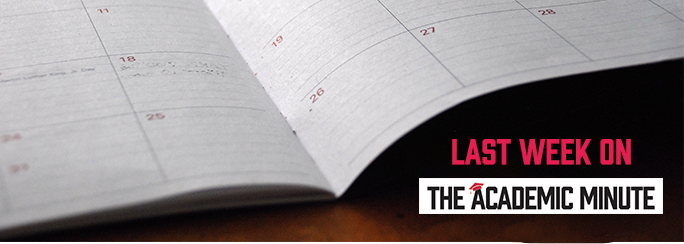
The Academic Minute from 4.03 – 4.07
Monday
Sarah Abreveya Stein – University of California Los Angeles
The Intersectional Space of a Vichy French WWII Labor Camp in the Algerian Sahara
Sarah Abrevaya Stein is Professor of History, Sady and Ludwig Kahn Director of the Alan D. Leve Center for Jewish Studies, and Viterbi Family Chair in Mediterranean Jewish Studies at UCLA. She is the author and editor of ten books, including, most recently, with Aomar Boum, Wartime North Africa: a Documentary History, 1934-1950 (Stanford University Press, with the cooperation of the United States Holocaust Memorial Museum, 2022) and Family Papers: A Sephardic Journey Through the Twentieth Century (FSG/Macmillan, 2019).
Tuesday
Dawn Brancati – Yale University
Locking Down ISIS
Senior Lecturer in the political science department at Yale University, who studies peacebuilding, especially in relation to democracy and democratic institutions
Wednesday
Joseph Larkin – University of Florida
What Do Babies’ Dirty Diapers Tell Us About COVID-19 Vaccination
Joseph Larkin III is an immunologist specializing in autoimmune diseases and novel treatments for these conditions. He is also interested in understanding how human milk affects infants’ immune systems.
Thursday
Andrew Neff – Emory University
Drug-Delivery Technology Opens New Doors for Psychiatric Treatments
Andrew Neff, Visiting Assistant Professor of Psychology at Oxford College of Emory University, researches mental health, education, and new technology developments in neuroscience. His Podcast and Audiobocalled Neighborhood Neuroscience is available on most major podcast platforms.
Friday
Kimia Ghobadi – Johns Hopkins University
One Size Doesn’t Fit All: An A.I. Approach to Healthier Eating
Kimia Ghobadi is a John C. Malone Assistant Professor in the Department of Civil and Systems Engineering at Johns Hopkins Whiting School of Engineering and an associate director of its Center for Systems Science and Engineering.
Her research focuses on using mathematical models, optimization techniques, and data analytics to solve problems in complex systems, particularly in healthcare and medical decision-making environments. She develops models and solution techniques in inverse optimization, mixed-integer programming, and online algorithms. Current projects include inverse optimization models for personalized diets and radiation therapy treatment plans, capacity management and resource allocation for healthcare systems, COVID-19 simulation and analytics, hospital scheduling and process efficiency, mobility in frail and elderly patients, and smart ICUs.
Before joining JHU in 2019, Ghobadi was a postdoctoral fellow at MIT Sloan School of Management and collaborated closely with the Massachusetts General Hospital on improving healthcare operations.
